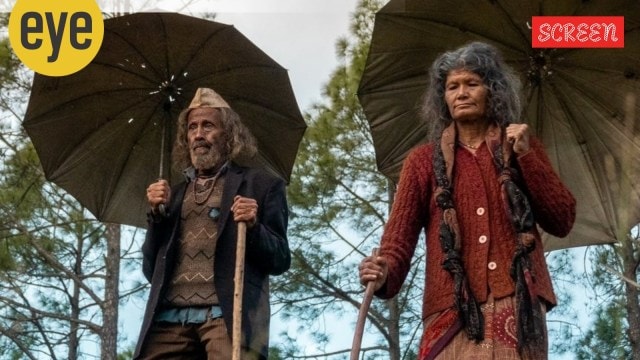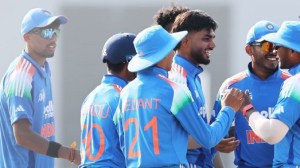As dark clouds hover and block the snow-capped Himalayas, as thunder rumbles, Bubu (Padam Singh) is preparing a pyre. Aama (Hira Devi), his wife, is watching him as he says, “I’m making this for you.” The moment of desolation and loneliness engulfs the frame as this elderly couple realises they are alone in the mountains.
Director Vinod Kapri’s film Pyre (2024) is as much a meditation on love and longing as it is about time and memory. As their village in the Uttarakhand mountains empties, with people leaving for better opportunities in the city, they await their son’s return. Central to the film is the silence, broken only by the banter of the two, amid an end looming over their heads.

The story stems from Kapri’s visit to Munsyari in 2017, where he met an elderly couple. “They had around 40 goats. When I asked the man why he kept so many, he said it was for those who helped him take his wife to the doctor. ‘Every time someone lends a hand, I give them a goat. As long as I have goats, she will survive.’ I asked him what he would do when he ran out of goats: Bakriyan khatam hone se pehle hum khatam honge (Before the goats are done, we will be gone), the man answered,” says Kapri.
This dialogue is in the film, which won the Audience Award at the Tallinn Black Nights Film Festival in Estonia in November last year and received a special jury mention at the Bengaluru International Film Festival in March. The lead actors, Singh and Devi, were nominated for best actors at the New York Indian Film Festival, held last month.
When we meet Devi at her home in Berinag, Pithoragarh, she is whipping up a meal for herself, after spending the morning weeding her small ragi patch on her farm. She lives alone in her hill house with two buffaloes while her four children are away in Dehradun and Haldwani. Her husband passed away from tuberculosis 20 years ago. “When I have to go to film festivals, I call my mother or daughter so my buffaloes do not go hungry. When I had to go to Estonia last year, all I could think of was how would my buffaloes get fed,” she says.
Set against the pine forested hills, with songs written by Gulzar and composed by the Academy Award winner Mychael Danna, the film will do the premiere circuit in Barcelona, London, Stuttgart and Melbourne, after which it will be released in theatres in India.
Initially, Kapri had tried getting the Munsyari couple to play their respective roles in the film but he gave up after 10 days. At last, he found talent closer home in his uncle, Singh, who has acted in Ramleelas in his village.
At his house, five kms away from Berinag, Singh is currently undergoing chemotherapy. In February last year, he lost his wife, his only family. “After she died, I lost everything. Now, these film festivals make me happy and hopeful,” says Singh, a former havildar, “I got married when India was at war with Pakistan and Bangladesh was formed,” he says. “I stepped out of the country for the first time to Tallinn. The only complaint I had was that I could not get rotis. I missed my home, the hills and the trees,” adds the 78-year-old. It was in Tallinn that he watched the film for the first time. “It is a reality for many of us; not even one dialogue is fictional. I cried watching it,” he says.
Story continues below this ad
Finding Devi was fortuitous for Kapri. In her village, she was popular for her hansi mazak but her son had to convince her to be part of the film.
Devi recalls that her first brush with films was when she would watch bits of the Mahabharat tele-series in the late ‘80s. “We were poor and did not have a TV, so I would go to my neighbour’s yard to steal a glance, but they would shut their doors seeing me. After the film (Pyre), I was gifted a TV. Now, I watch whatever comes on it,” she says.
Devi would spend sleepless nights reading the script and memorising her lines. Towards the end, she could not bring herself to play Aama. “There is a dialogue about losing children and I felt I was wronging them by saying it. Also, we cannot wear a nath after the death of our husbands. I felt sad wearing it again. I was also uneasy to act with a man who was not my husband,” she says.
Today, Devi is a star in her village. When she goes to the community water tap, children and their mothers smile at her. As Devi looks out of her blue-painted windows, she points toward a distant village: “That’s where Padam Singh lives — it’s a ghost village. Every house there is padlocked, just like in the movie.”

































